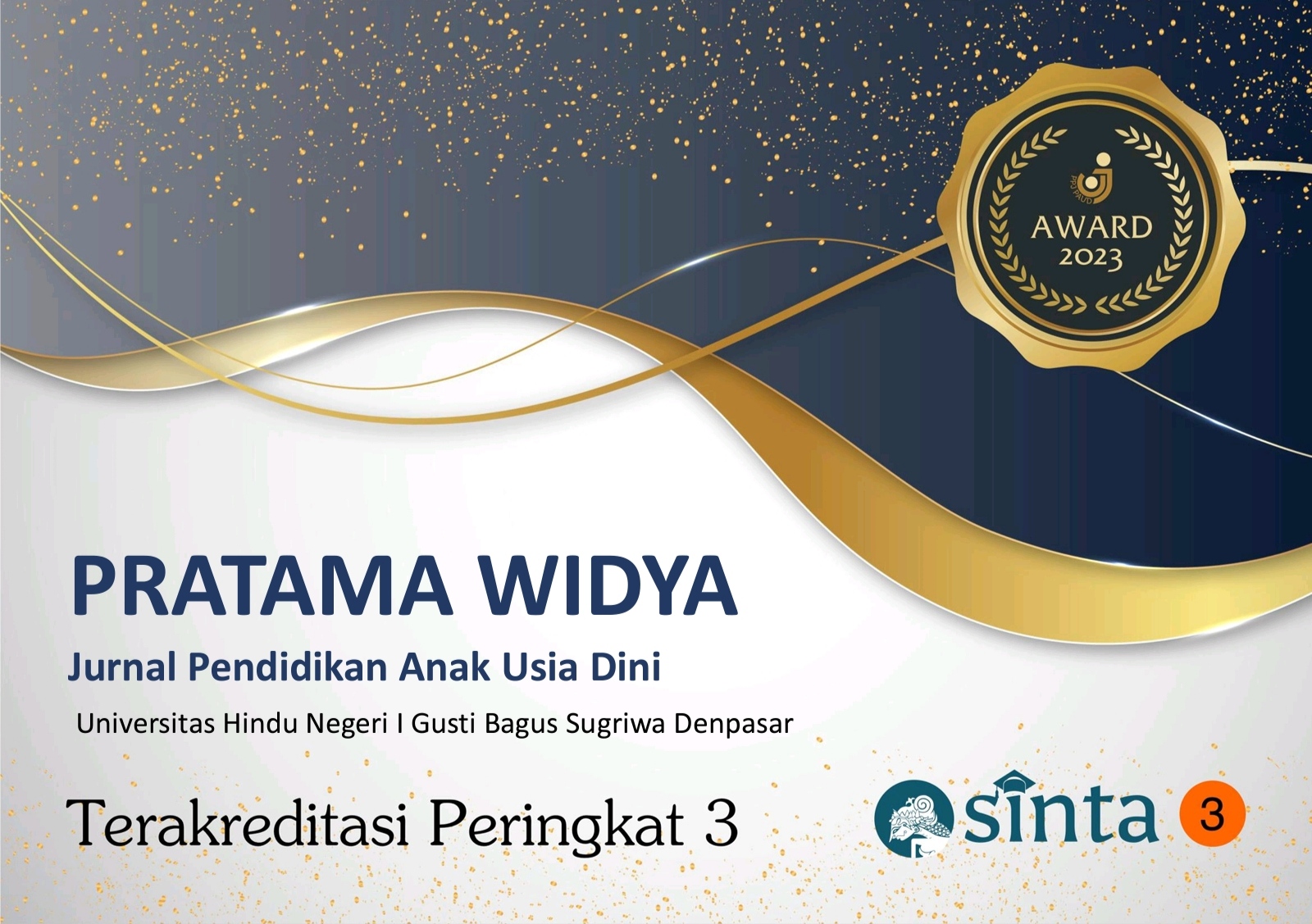KERAGAMAN BUDAYA PENGASUHAN ANAK USIA DINI : KAJIAN GROUNDED THEORY KELUARGA KUTAI BANJAR DAYAK
DOI:
https://doi.org/10.25078/pw.v7i2.1520Keywords:
Early Childhood, Ethnoparenting, Indigenous Parenting, LearningAbstract
The limited research studies on early childhood care culture in the tribal context in Indonesia have encouraged researchers to be interested in raising the issue of how early childhood care cultures in East Kalimantan. The purpose of this study is to narrate the culture of early childhood care across tribes (Kutai, Banjar, and Dayak) and the internalization process is reviewed the values adopted, internalization of character and are that is applied. The research method used in this study is grounded theory. Data collection was carried out through semi-structured interviews in 6 participants consisting of three experts and three families from Samarinda City. The question form is in the form of experience in early childcare that allows them to explore the answer in terms of cultural dimensions. Researchers also adopted a quality research code of ethics to disguise the identity of participants in a thematic data analysis approach. The results of the study concluded that the culture of early childhood care for kutai, Banjar and Dayak families in East Kalimantan was influenced by historical perspectives and internalization of parenting through habituation and tribal values as learning children's character at home. This is known in the practice of habituation in the home environment is consistently carried out by the family. In other words, the contribution of this study can be used as an empirical study of the culture of early childhood care based on tribal culture (ethnoparenting).
References
Aulia, S., & Agustin, H. Y. (2020). Nilai Ketekunan Pada Dindang Kepada Anak Pada Masyarakat Banjar Hulu Sungai Tengah Kalimantan Selatan. Martabat: Jurnal Perempuan Dan Anak, 4(1), 65–78. https://doi.org/10.21274/martabat.2020.4.1.65-78
Ayu, I. G., & Budiasih, N. (2013). Metode Grounded Theory Dalam Riset Kualitatif. Jurnal Ilmiah Akuntansi Dan Bisnis, 9(1), 19–27.
Bakker, J. I. (Hans. (2019). Grounded Theory Methodology and Grounded Theory Method: Introduction to the Special Issue. Sociological Focus, 52(2). https://doi.org/10.1080/00380237.2019.1550592
Conner, C. T. (2017). God Save the Ethnographic Method! (From Co-Optation). Symbolic Interaction, 40(4). https://doi.org/10.1002/symb.307
Dara, D. G. R., Zarkasih Putro, K., & Irsyad, M. (2021). Analisis Adat Budaya Aceh Pada Tradisi Mee Buu Tujuh Bulanan Ibu Hamil. Jurnal Pelita PAUD, 6(1). https://doi.org/10.33222/pelitapaud.v6i1.1494
Fitri, R., & Rakimahwati, R. (2021). Game Edukasi Berbasis Budaya Lokal Sumbang Duo Baleh untuk Meningkatkan Kecerdasan Interpersonal Anak. Jurnal Obsesi : Jurnal Pendidikan Anak Usia Dini, 6(1). https://doi.org/10.31004/obsesi.v6i1.1220
Fleer, M., Hedegaard, M., Ødegaard, E. E., & Sørensen, H. V. (2021). Cultures of Play and Learning in Transition. In Qualitative Studies of Exploration in Childhood Education. https://doi.org/10.5040/9781350199453.ch-1
Fragkiadaki, G., Fleer, M., & Rai, P. (2021). The social and cultural genesis of collective imagination during infancy. Learning, Culture and Social Interaction, 29. https://doi.org/10.1016/j.lcsi.2021.100518
Handoko, W. D., Fauziah, P., & Dimyati, D. (2021). Gaya Pengasuhan Anak Usia Dini pada Suku Dayak Dusun Laek Desa Bengkilu. Jurnal Obsesi : Jurnal Pendidikan Anak Usia Dini, 6(2). https://doi.org/10.31004/obsesi.v6i2.1021
Hassani, F., Shahrbanian, S., Shahidi, S. H., & Sheikh, M. (2020). Playing games can improve physical performance in children with autism. International Journal of Developmental Disabilities. https://doi.org/10.1080/20473869.2020.1752995
Hovdelien, O. (2014). The limitations of multiculturalism in Norwegian early childhood education. International Journal of Inclusive Education, 18(11). https://doi.org/10.1080/13603116.2013.875069
Istiqomah, E., & Setyobudihono, S. (2017). Nilai Budaya Masyarakat Banjar Kalimantan Selatan: Studi Indigenous. Jurnal Psikologi Teori Dan Terapan, 5(1). https://doi.org/10.26740/jptt.v5n1.p1-6
Jones, T. (2013). Through the lens of home-educated children: Engagement in education. Educational Psychology in Practice, 29(2). https://doi.org/10.1080/02667363.2012.755614
Kinkead-Clark, Z. (2020). Using socio-cultural lens to explore adult–child interactions in Jamaica’s childcare settings. International Journal of Early Years Education, 28(1). https://doi.org/10.1080/09669760.2019.1685469
Nurani, Y., & Pratiwi, N. (2020). Curriculum Design of Early Childhood Life Skill Based on Indonesian Local Culture. https://doi.org/10.2991/assehr.k.200323.145
Paz-Albo Prieto, J. (2018). The influence of simulations on family engagement–prospective early childhood educators’ perceptions. Early Child Development and Care, 188(2). https://doi.org/10.1080/03004430.2016.1202946
Rachmawati, Y. (2020). Pengembangan Model Etnoparenting Indonesia pada Pengasuhan Anak. Jurnal Obsesi : Jurnal Pendidikan Anak Usia Dini, 5(2). https://doi.org/10.31004/obsesi.v5i2.706
Rahmawati. Yeni; Yi-Fong, Pai; Chen, H. (2014). The Necessity of Multicultural Education in Indonesia. International Journal of Education and Research, 2(10).
Sada, C., Alas, Y., & Anshari, M. (2019). Indigenous people of Borneo (Dayak): Development, social cultural perspective and its challenges. In Cogent Arts and Humanities (Vol. 6, Issue 1). https://doi.org/10.1080/23311983.2019.1665936
Sugiarti, D., Rahmi, S., & Suriata, S. (2021). Pola asuh suku dayak lundayeh di kota tarakan. Orien: Cakrawala Ilmiah Mahasiswa, 1(1). https://doi.org/10.30998/ocim.v1i1.4571
Williams, C. E., Hadwin, J. A., & Bishop, F. L. (2021). Primary teachers’ experiences of teaching pupils with selective mutism: a grounded theory study. Educational Psychology in Practice, 37(3). https://doi.org/10.1080/02667363.2021.1920372
Wulandari, I. D. . (2019). Klasifikasi Tipe Pola Asuh Orang Tua Berdasarkan Teori Baumrind Menggunakan Metode Naive Bayes. In Muhammadiyah University Of Gresik Repository.
Yang, W., Li, H., & Ang, L. (2021). Early childhood curriculum policies and practices in Singapore: The case of glocalisation. Policy Futures in Education, 19(2). https://doi.org/10.1177/1478210320987689
Yulia Hairina, M. P. (2016). Dinamika Perubahan Pola Pengasuhan Anak Dalam Masyarakat Banjar. Transpormasi Sosial Dan Intelektual Orang Banjar Kontemporer.
Zakaria, M. R. A. (2020). Pengalihan peran sementara pengasuhan anak dari orang tua ke nenek dan kakek. Jurnal Sosiologi Dialektika, 14(2). https://doi.org/10.20473/jsd.v14i2.2019.120-125
Downloads
Published
How to Cite
Issue
Section
License
Copyright (c) 2022 Fachrul Rozie, Wilda Isna Kartika, Tiara Nurhaliza, Risda Amalia, Muhammad Henry Gunawan

This work is licensed under a Creative Commons Attribution-NonCommercial-ShareAlike 4.0 International License.








